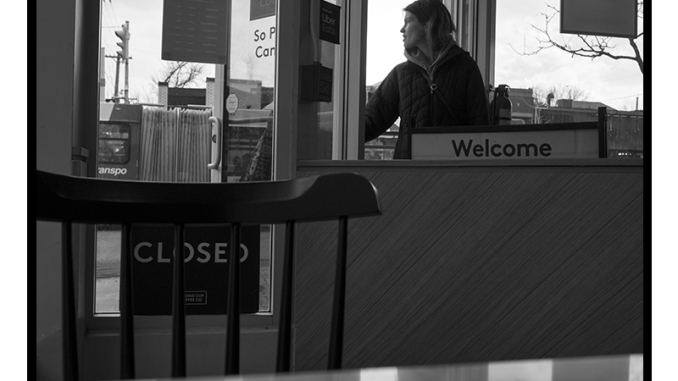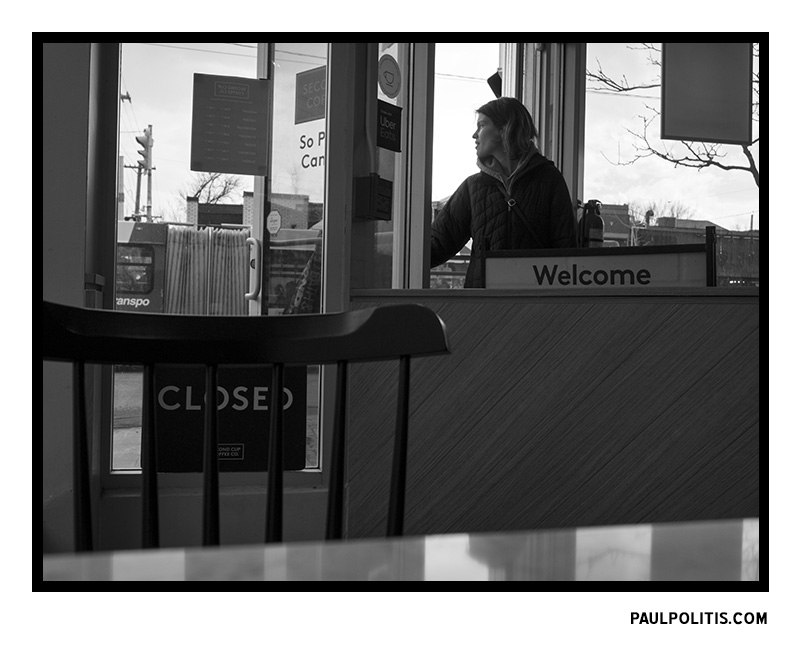
I stopped for a coffee after a few hours of wandering the city when this young lady framed herself nicely, for a brief moment, in the doorway of the coffee shop.
For those interested in Robert Pirsig and Zen and the Art of Motorcycle Maintenance, I recently watched the video below where he talks about the creative process as he experienced it. The Q&A at the end is also very good.
“I think that’s about what I want to say about the creative process as I have seen it and have gone through it in terms of these two books, the first one in which I saw the book as something separate from myself, something I was going to do. I was going to be a writer, you see, I was role-playing the thing. The second time I wasn’t being a writer, I was responding to a real need and I was going to write that book whether I was a writer or not. I felt that this was a very important thing to learn and if I were going to pass something on to anybody I’d say that’s it: let it come out of you, don’t be apart from it. […] I think that kind of way of doing things is the right way, and the way that produces things that are of real value. Where there’s no separateness between the doer and the done. And when that happens you know it, you just feel it. It’s just ‘Wow’. It’s just a whole other thing. But it takes a lot of frustration to reach it.”
On Quality:
“The ultimate Quality, the Quality that Phaedrus saw in the end [in ZAMM] is a Quality that cannot be apprehended by rational means. No proofs are possible. […] The ultimate proof which is given in the four thousand year old Upanishads is ‘he who knows this has no further doubts’. To subject it to rational proofs is to place the proofs in a higher position than Quality itself. […] This is what was done by the Socratics, […] they elevated the proofs and they subordinated Quality … or they subordinated the Good, which is an equivalent term. Or the dharma. And all of a sudden we have a world in which Reason dominates what’s Good rather than what’s Good dominates Reason. […] The most important sentence in the discourse on Quality is when Phaedrus is really done for, […] when his Self is gone, when all his rational arguments are demolished, when there’s nothing left, no personality, anything, then at that moment the Quality which all this time he had never understood is finally made apparent, beyond rationality.”
“We’ve been brainwashed, I think, to believe that nothing’s true until we proved it’s true and I think because of this artists, particularly in the visual arts, have been always subordinate to intellectuals in the structure of society because they say ‘what are they doing?’ and of course it’s very hard to come up with an answer unless you say ‘we’re producing Quality’ and they say ‘well, what’s that?’, you know, and they want you to define it. And so this is kind of a way of saying ‘No, I refuse to define it, but boy you better know it’s there’.”
“In my own belief Plato created a society in which artists were at the bottom rung […] and they had at one time a much higher status in Greece. […] It’s my belief that the people that are most concerned with Quality … who are directly concerned with Quality to the exclusion almost of everything else, are the people in the Arts, and they should have the highest place in society, not the lowest.”
“One of the advantages of keeping Quality undefined … as long as you keep it undefined, then it becomes an instrument of change, and you can grow, because the things that you find Quality in are going to change as you grow.”
There’s more but I’m tired of typing.
